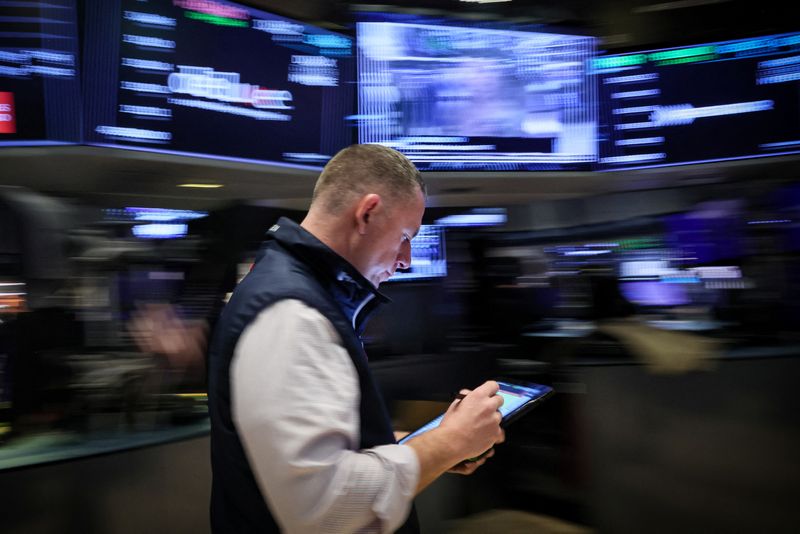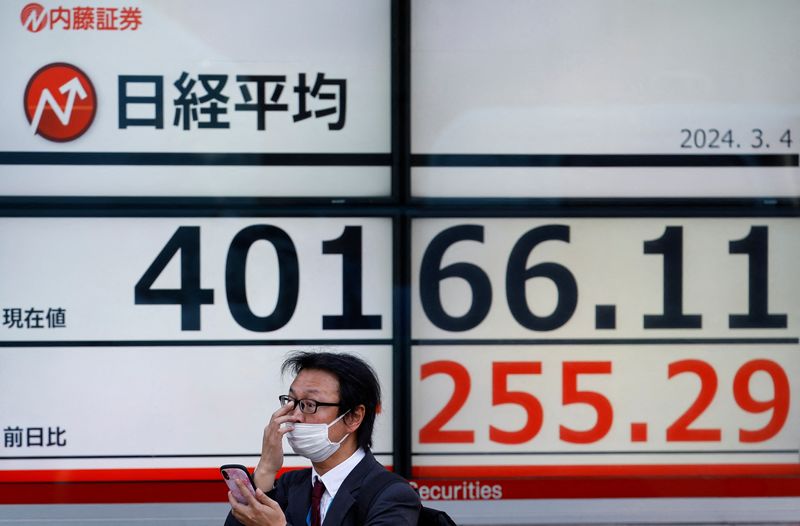By Alden Bentley and Huw Jones
NEW YORK/LONDON (Reuters) -Investors stretched record-breaking stock rallies on Friday, before Wall Street took profits, while U.S. Treasury yields dipped after not-too-hot, not-too-cold U.S. jobs data reinforced the conviction that the Federal Reserve will begin easing by mid-year.
Two U.S. stock indexes advanced into uncharted territory after the Labor Department said U.S. job growth accelerated in February, even as the unemployment rate jumped and wage gains moderated. The mixed report kept on the table an anticipated interest rate cut in June by the Fed.
But the S&P 500 and the Nasdaq reversed course while the Dow Jones Industrial Average did not reach a record high. The Dow fell 68.66 points, or 0.18%, to close at 38,722.69, the S&P 500 lost 33.67 points, or 0.65%, to close at 5,123.69 and the Nasdaq Composite lost 188.26 points, or 1.16%, to close at 16,085.11.
"I don't think this is anything other than taking a little money off the table. I don't think it does anything for the momentum," said Scott Wren, Senior Global Market strategist, Wells Fargo (NYSE:WFC) Investment Institute in St. Louis. "Now, do I think there's a probability we see a decent pull back, five or 10%, over the course of next month or two? I do."
With the widely anticipated payrolls number out of the way, attention immediately turned to next Tuesday's U.S. Consumer Price Index inflation report.
This week, central bankers from the United States and Europe raised expectations that cuts in borrowing costs will begin in the summer on both sides of the Atlantic, pushing stock indices to new highs again on Friday.
A day after the European Central Bank held rates steady, ECB policymaker Francois Villeroy de Galhau said there would be a rate cut in the spring, which he defined as from April until June 21, the date of the central bank's meeting that month.
Markets have priced in a Fed rate cut in June as well. Some traders even bet on a May rate cut by the Fed after U.S. employers added a surprisingly robust 275,000 jobs last month, even while figures for prior months were revised down to show fewer job gains.
"The immediate takeaway is the focus on the unemploymentrate going from 3.7% to 3.9%," said Robert Pavlik, senior portfolio manager at Dakota Wealth.
"More unemployment rate implies that the economy is slowing, which would, in the markets' view hopefully, necessitate a rate cut sooner rather than later."
MSCI's gauge of stocks across the globe rose to its highest level ever then closed off 0.27%.
In Europe, the STOXX index of 600 companies hit a new lifetime high, ending just 0.02% higher, while Europe's broad FTSEuroFirst 300 index slipped 0.03%.
While central banks on both sides of the Atlantic manage expectations of exactly when they will start lowering borrowing costs, investors pushed up the yen after reports that Japan's central bank may begin hauling up rates from negative territory as soon as this month.
MSCI's broadest index of Asia-Pacific shares outside Japan went up 1.01%, while Japan's Nikkei rose 90.23 points, or 0.23%.
The dollar headed for its sharpest weekly drop of the year on the growing likelihood of lower borrowing costs.
Against the Japanese yen, the dollar weakened 0.66% to 147.05. The dollar index, a basket comprised of six currencies from major U.S. trade partners, fell 0.03%. Its largest component, the euro, fell 0.06% to $1.0939.
Hopes of rate cuts put downward pressure on U.S. government bond yields. The yield on benchmark U.S. 10-year notes fell to its lowest since Feb. 2 but in late trade was only down 0.3 basis points from Thursday at 4.089%.
The 2-year note yield, which typically moves in step with rate expectations, fell to its lowest since Feb. 7, and was last 2.4 basis points lower at 4.4902%.
German bund yields were on track to record their biggest weekly fall since mid-December on raised bets of an ECB cut in rates.
Spot gold logged another record and added 0.87% to $2,177.99 an ounce. U.S. gold futures gained 0.92% to $2,177.80 an ounce.

U.S. crude settled down 1.17% at $78.01 a barrel and Brent fell to $82.02 per barrel, down 1.12% to on the day.
In cryptocurrencies, bitcoin popped to a record high, after a three-day breather since setting its last one. It briefly topped $70,000 for the first time and was up 2.90% at $69,298.00 in late trade. Ethereum rose 2% at $3952.4.
